Hello!
The fifth newsletter focuses on the International Literacy Day celebrated on the 8 of September.
On this occasion, some partners present the event they organized to celebrate this day, others share with us the challenges and issues they face in their countries or regions regarding literacy.
The newsletter is also available in a pdf version.
Enjoy!
International Literacy Day
It’s been almost fifty years since the 8 September was chosen by UNESCO to become the International Literacy Day in order to highlight the importance of literacy for individuals, communities and societies.
The objective perfectly makes senses considering that 793 million adults still lacked basic literacy skills in 2009, the majority of them being girls and women.
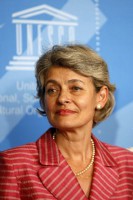 This year’s International Literacy Day will focus on the link between literacy and peace. The day was launched in New Delhi, India, during the International Conference on Women’s Literacy for Inclusive and Sustainable Development, organized from 8 to 10 September.
This year’s International Literacy Day will focus on the link between literacy and peace. The day was launched in New Delhi, India, during the International Conference on Women’s Literacy for Inclusive and Sustainable Development, organized from 8 to 10 September.
In the message issued to the international organizations, to the civil society and to the private sector, Director-General of UNESCO Irina Bokova highlighted that literacy empowers individuals, allowing them to effectively participate in democratic processes and strengthening mutual understanding.
This way, literacy becomes a development accelerator and a force for peace. It is possible to understand the specific benefits of literacy just by looking at the four projects that have received the UNESCO Literacy Prizes 2011. These prizes were granted in New Delhi to programmes from Burundi, Mexico, United States of America and the Democratic Republic of the Congo. A description of the award-winning programmes is available on the Unesco website
Apart from these prestigious awards, different events have been organized worldwide to celebrate International Literacy Day.
Following their principles and philosophy, Eur-Alpha partners have actively involved learners in this celebration, which is ultimately dedicated to them.
Learners publication in the spotlight– Education Scotland
This year Education Scotland’s Communities Team marked International Literacy Day with a gathering of key figures in Adult Literacies work in Scotland.
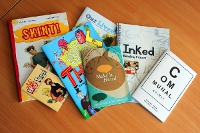 Besides the government representatives who gave an overview of the state of literacy in Scotland, the Conference also saw the launch of a new suite of Learner Publications, developed by local Adult Literacy groups and local authorities across Scotland. These interesting, funny and thought-provoking texts are available to everyone across the country and other learners might find them a valuable resource in their own learning journeys.
Besides the government representatives who gave an overview of the state of literacy in Scotland, the Conference also saw the launch of a new suite of Learner Publications, developed by local Adult Literacy groups and local authorities across Scotland. These interesting, funny and thought-provoking texts are available to everyone across the country and other learners might find them a valuable resource in their own learning journeys.
The collection is published by Scottish Book Trust. It includes “Hot Tips”, a pocket-sized booklet with hints and tips for other literacy learners, and “An Apple a Day”, a collection of illustrated poems, stories and jokes themed around the light-hearted side of health issues.
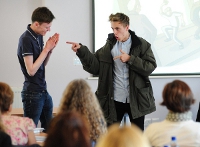 While each publication has a different theme and style, they all focus on the experiences, opinions and creativity of learners. Learners read out excerpts from the collection. The graphic novel about financial capability called SKINT! was expertly and enthusiastically brought to life by the Scottish Youth theatre.
While each publication has a different theme and style, they all focus on the experiences, opinions and creativity of learners. Learners read out excerpts from the collection. The graphic novel about financial capability called SKINT! was expertly and enthusiastically brought to life by the Scottish Youth theatre.
“We’ve got as much talent as you do“ – Lire et Écrire Belgium
Every year Lire et Écrire celebrates International Literacy Day by launching an awareness campaign in the french-speaking part of Belgium.
 This year the campaign has been innovative both in its form and content. Lire et Écrire has transmitted their message by means of table mats distributed in the canteens of important administrations and companies, in cultural and social organizations or in local cafés. The table mats have left a lasting impression and have given food for thought about literacy issues.
This year the campaign has been innovative both in its form and content. Lire et Écrire has transmitted their message by means of table mats distributed in the canteens of important administrations and companies, in cultural and social organizations or in local cafés. The table mats have left a lasting impression and have given food for thought about literacy issues.
Concerning the content, it was our learners who chose the message to be transmitted: “We’ve got as much talent as you do“, they claimed. Not only were they committed in the whole process of campaign design (preparation, slogan, graphics, dissemination), but they also prepared personal postcards explaining their circumstances.
“A story with me in it“ – NALA
To celebrate International Literacy Day, the National Adult Literacy Agency (NALA) hosted a story reading event in the National Library of Ireland.
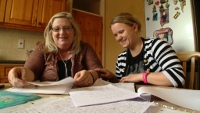 Well known authors Sheila O’Flanagan, Peter Sheridan and Marita Conlon McKenna joined eight literacy students as they read their personal stories and poems. The aim of the event was to promote literacy and encourage all people to write a story.
Well known authors Sheila O’Flanagan, Peter Sheridan and Marita Conlon McKenna joined eight literacy students as they read their personal stories and poems. The aim of the event was to promote literacy and encourage all people to write a story.
“To go from thinking I was just a nobody to standing up in front of all those lovely people was just amazing” said Eileen Sheehan who read her story in front of 70 people, four years after returning to adult education through her local Adult Education project in Moyross, Limerick.
At the event NALA also discussed details of its new website www.astorywithmeinit.ie that allows members of the public to showcase their writing. The website is specifically aimed at emergent writers and so far showcases over 70 stories, mainly from literacy students.
While not a competition, members of the public can submit and rate stories, and those with the highest recommendations get promoted on the home page. Stories and poems can be entered under a number of categories, including achievement, family, friends, humour, kindness, love and poetry.
Learners Forum – Cyprus Adult Education Association
To mark the 8 September in a special way, Cyprus Adult Education Association (CAEA) has held a conference in Latsia, a municipality belonging to the capital city of Nicosia. A great array of officials were present: the major of Latsia, representatives of the Ministry of Education, partner associations...
Apart from the president of CAEA and the major of Latsia, who expressed their point of view as institutions, the representatives from the Cypriot Learners Forum shared their experience in the Eur-Alpha network and emphasized the importance of making themselves heard by decision makers. About forty people attended the conference.

Literacy status report
International Literacy Day is also a good opportunity to look back and analyse literacy in each one of our countries. Eur-Alpha partners have put their shoulders to the wheel and they are sharing with us the challenges and issues they face in their countries or regions regarding literacy.
Basic Skills Education: an essential issue – CFAES Georges Rapon
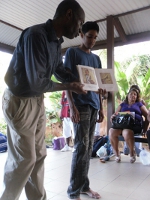 In Guyana most people don’t have French as mother tongue nor use it as their main language of communication. Guyanese people without a basic command of the French language face serious obstacles to access education and information, what in turn causes them problems to integrate socially and professionally.
In Guyana most people don’t have French as mother tongue nor use it as their main language of communication. Guyanese people without a basic command of the French language face serious obstacles to access education and information, what in turn causes them problems to integrate socially and professionally.
For this reason, the development of education and basic training is an essential measure to fight the social exclusion or discrimination that affects a large part of the population, irrespective of age and working sector. It is also of utmost importance to start bearing fruit of the abundant wealth in this region.
In answer to the International Literacy Day, two events were organized this year: a networking day for the mobilisation and collaboration in literacy and Education for Everybody Day.
Guyanese learners use new technologies as a means for self-determination and they’ve created the blog The Travelling Tree. In this blog you can find a video about the action “Découverte des albums jeunesse“ (Discovering of children’books).
A worrying state of affairs in Northern Ireland – Queen’s University of Belfast
The 1996 International Adult Literacy Survey (IALS) showed that 1 in 4 people of working age in Northern Ireland did not have functional levels of literacy and numeracy and that the incidence of the problem in Northern Ireland was higher than in all but one of the 14 countries participating in the Survey.
Recent examination results for 16 year-olds show that, alarmingly, despite various initiatives and strategies for raising literacy and numeracy, one in four school leavers continue to fail to achieve a satisfactory grade in English or Maths. Northern Ireland continues to have the highest level of underachievement in these two subjects across the United Kingdom.
Northern Ireland will participate in the next IALS survey that is due to commence in 2011, but these statistics suggest that Northern Ireland might continue to perform badly and progress on many of the key issues and initiatives to deal with young adults without fundamental skills in literacy and numeracy, remains far too slow.
Re-thinking literacy in Slovenia – SIAE
Literacy has been neglected in Slovenia for a long time. Things are starting to change and politicians pay more attention to adult education. To learn more about the situation in Slovenia , download the report of the Slovenian Institute for Adult Education, a privileged observer of the sector.
Fight against illiteracy in France – AEFTI
L’AEFTI offers us a multidimensional perspective by explaining the international, European and national context influencing its actions. The document is available here
Eur-Alpha News
Preparatory meeting for the final conference in Bonn
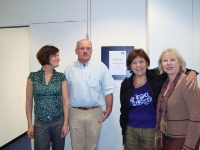 As we shift into the last year of the network, the urge to prepare the final conference is slowly pushing ahead. Jacques, Nadia and Delphine met Monika in Bonn (DIE) in order to visit the conference site and establish the basis for the agenda. They also used the chance to pay a visit to the DIE headquarters and their impressive library dedicated to adult education.
As we shift into the last year of the network, the urge to prepare the final conference is slowly pushing ahead. Jacques, Nadia and Delphine met Monika in Bonn (DIE) in order to visit the conference site and establish the basis for the agenda. They also used the chance to pay a visit to the DIE headquarters and their impressive library dedicated to adult education.
New incomer in the Eur-Alpha coordination team
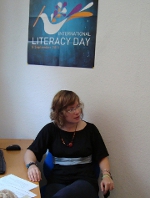 Mid-September, we welcomed a Grundtvig assistant in our offices. Teresa is a Spanish translator and a teacher who is here to support our team for three months under the Grundtvig Assistantship programme.
Mid-September, we welcomed a Grundtvig assistant in our offices. Teresa is a Spanish translator and a teacher who is here to support our team for three months under the Grundtvig Assistantship programme.
If you are an organization offering training for adults, you could also ask for a Grundtvig assistant for 3 to 10 months. The assistant receives a subsidy from the European Commission to cover some expenses. To start working in September 2012, the future assistant should notice their national agency before March 2012 EU website
Eur-Alpha Agenda
23-29 October 2011: Trainers Workshop in Mâcon
To find out about the agenda and registration requirements, please go to Eur-Alpha web site. Registration is still open but it’s no longer possible to obtain a Grundtvig grant. More information on the Eur-Alpha website
24-30 October 2011 : Learners Workshop in Barcelona
Registration is closed.
4-7 December 2011 : Meeting of the working groups in Lisbon
News from the partners
“Situations of cultural contact and transmission issues” – Va Savoirs
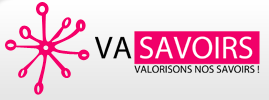 Va Savoirs, associate partner in Eur-Alpha, will hold its first Study Day on 15 December in Paris. Va Savoirs works mainly in the field of cultural and linguistic contacts in link with immigration and wants to launch a new dynamic involving researchers and on-site workers. This session will be dealing with the types of transmission and their actors regarding 3 topics: body language techniques, language and cultural heritage transmission.
Va Savoirs, associate partner in Eur-Alpha, will hold its first Study Day on 15 December in Paris. Va Savoirs works mainly in the field of cultural and linguistic contacts in link with immigration and wants to launch a new dynamic involving researchers and on-site workers. This session will be dealing with the types of transmission and their actors regarding 3 topics: body language techniques, language and cultural heritage transmission.
To obtain further details, please visit Va Savoirs web site or download the detailed programme here.
Alpha Voice – CFPPA du Morvan
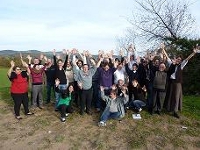 Associate partner in our network, CFPPA also coordinates with FARLCI another Grundtvig project called Alpha Voice. Four associations (from France, Italy, Romania and United Kingdom) as well as a Belgian associate partner have launched a European literacy learners network to defend the right to lifelong learning.
Associate partner in our network, CFPPA also coordinates with FARLCI another Grundtvig project called Alpha Voice. Four associations (from France, Italy, Romania and United Kingdom) as well as a Belgian associate partner have launched a European literacy learners network to defend the right to lifelong learning.
Learners are at the centre of the network and the two first meetings (in France and in Italy), were participative and co-constructed. Associations and learners already benefit a lot from the network. Among other things, they learn to be open-minded and to respect other cultures, they are encouraged to gain a retrospective and critical look on their personal situation and on their practice, it helps them to stop feeling isolated, to start new projects and it increases their credibility and legitimacy when they go back home.
Family literacy in Europe-UIL
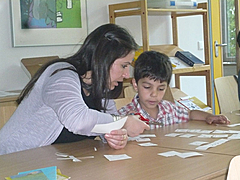 A new study produced for the European Commission on “Family literacy in Europe: using parental support initiatives to enhance early literacy development“ concludes that involving families in literacy programmes is essential to increasing literacy levels of children and adults.
A new study produced for the European Commission on “Family literacy in Europe: using parental support initiatives to enhance early literacy development“ concludes that involving families in literacy programmes is essential to increasing literacy levels of children and adults.
UIL has contributed as a partner to this research project, which was coordinated by the National Research and Development Centre for Adult Literacy and Numeracy (NRDC) in the UK. Two specialists from UIL were part of the research team and contributed to the policy recommendations.
The executive summary of the study is available here
Next newsletter
The next newsletter will be published between the end of December and the beginning of January. All announcements must be sent before 8 December 2011 at coordination@eur-alpha.eu.
Photos credits : Irina Bokova, Director-general of UNESCO ©REUTERS/Charles Platiaus - The collection of learners publications ©Education Scotland - SKINT! performed by the Scottish Youth theatre© Education Scotland - Table mat of the campaign.©Lire et Ecrire Belgium - Marita and Susan at work ©NALA- Conference in Latsia©CAEA- Exploring children literature ©CFAES Georges Rapon - Delphine, Jacques, Nadia and Monika at DIE headquarters.©Lire et Ecrire - Teresa in her new office ©Lire et Ecrire - Alphavoice Learners meeting©CFPPA du Morvan - Family literacy© UIL


